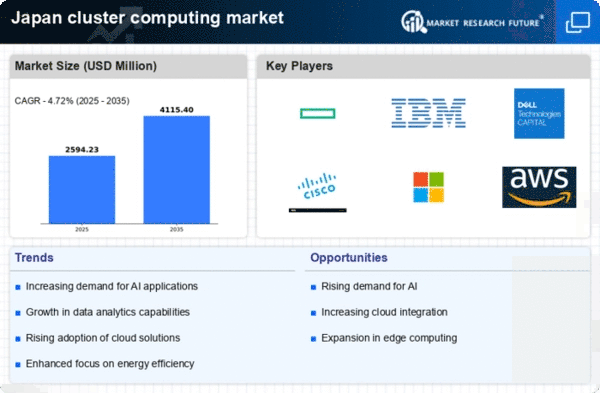Increased Data Processing Needs
The surge in data generation across various sectors in Japan is driving the cluster computing market. Organizations are increasingly reliant on data analytics to derive insights, optimize operations, and enhance decision-making. This trend is particularly evident in industries such as finance, healthcare, and manufacturing, where data-driven strategies are becoming essential. As a result, the demand for high-performance computing solutions that can efficiently process large datasets is on the rise. According to recent estimates, the data analytics market in Japan is projected to grow at a CAGR of approximately 15% over the next five years, further fueling the need for robust cluster computing systems. Consequently, businesses are investing in advanced cluster computing technologies to meet their data processing requirements, thereby propelling the growth of the cluster computing market in Japan.
Government Initiatives and Support
The Japanese government is actively promoting the adoption of advanced computing technologies, including cluster computing, as part of its broader strategy to enhance the nation's technological capabilities. Initiatives aimed at fostering innovation and research in high-performance computing are being implemented, with funding allocated to support academic institutions and private enterprises. This governmental backing is likely to stimulate investments in the cluster computing market, as organizations seek to leverage these technologies for competitive advantage. Furthermore, the government's focus on digital transformation across various sectors is expected to create a conducive environment for the growth of the cluster computing market. As a result, businesses are increasingly aligning their strategies with government initiatives, which may lead to a more robust ecosystem for cluster computing solutions in Japan.
Advancements in Networking Technologies
The evolution of networking technologies in Japan is playing a pivotal role in shaping the cluster computing market. Innovations such as 5G and enhanced fiber-optic networks are enabling faster data transmission and improved connectivity, which are essential for the efficient operation of cluster computing systems. As organizations seek to harness the power of distributed computing, the demand for high-speed networking solutions is likely to increase. This trend is particularly relevant for industries that require real-time data processing and analysis, such as telecommunications and finance. The cluster computing market is expected to benefit from these advancements, as businesses invest in infrastructure that supports high-performance computing capabilities. With the networking landscape evolving rapidly, the potential for growth in the cluster computing market appears promising.
Growing Need for Disaster Recovery Solutions
As businesses in Japan become more reliant on digital operations, the need for robust disaster recovery solutions is becoming increasingly critical. Cluster computing systems offer enhanced reliability and redundancy, making them an attractive option for organizations seeking to safeguard their data and maintain operational continuity. The cluster computing market is likely to see growth as companies prioritize investments in disaster recovery strategies to mitigate risks associated with data loss and system failures. According to industry analyses, the disaster recovery market in Japan is projected to grow at a CAGR of around 12% over the next few years, indicating a rising awareness of the importance of data protection. This trend may lead to increased adoption of cluster computing technologies, as businesses look for effective solutions to ensure their resilience in the face of potential disruptions.
Emergence of Artificial Intelligence Applications
The rise of artificial intelligence (AI) applications in Japan is significantly impacting the cluster computing market. AI technologies require substantial computational power to process complex algorithms and large datasets, which cluster computing systems are well-equipped to provide. Industries such as automotive, robotics, and finance are increasingly integrating AI into their operations, necessitating the deployment of advanced computing infrastructures. The cluster computing market is expected to benefit from this trend, as organizations invest in scalable and efficient computing solutions to support their AI initiatives. Recent reports indicate that the AI market in Japan is anticipated to reach a valuation of over $20 billion by 2026, suggesting a strong correlation between AI growth and the demand for cluster computing resources. This dynamic is likely to drive innovation and investment in the cluster computing market.
















